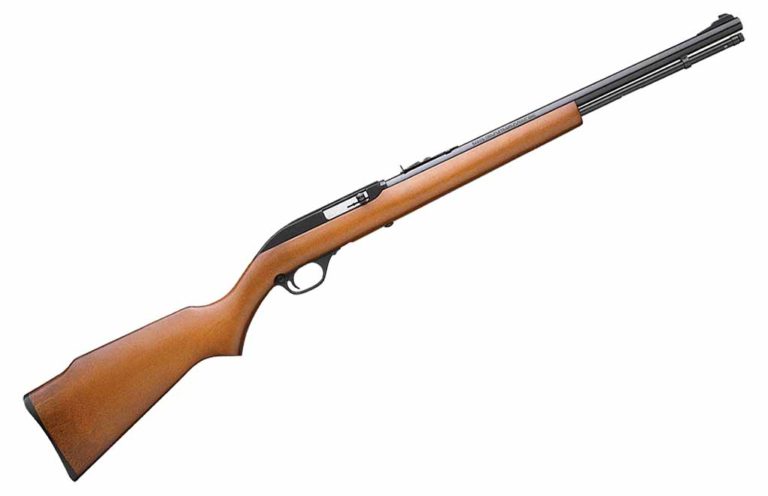
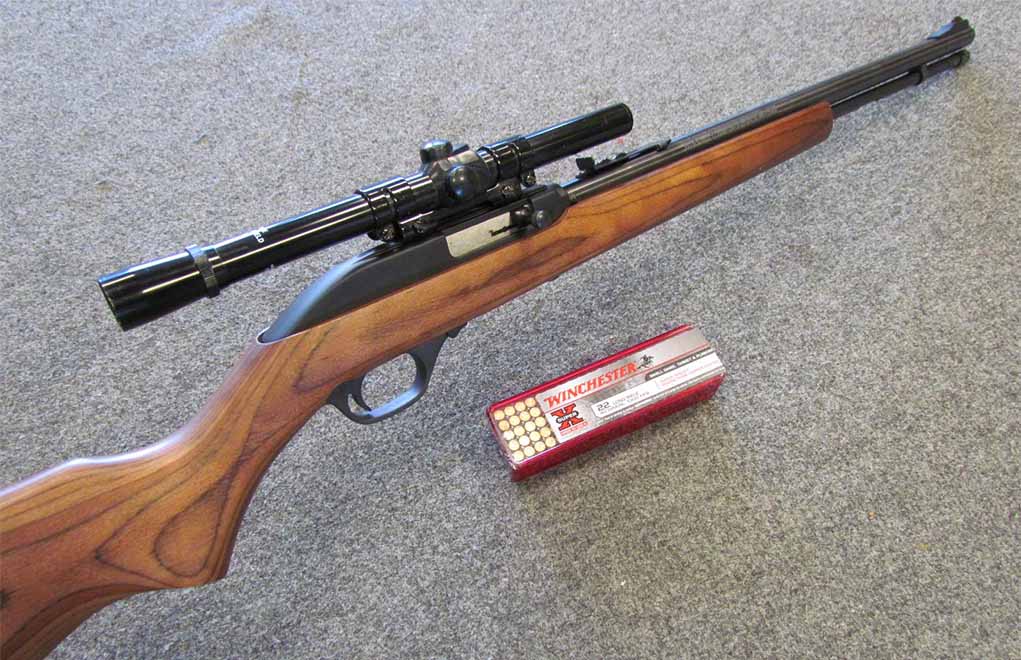
Affordable, reliable and, above all, accurate, the decidedly unglamorous Marlin Model 60 continues to define what a semi-auto .22 rifle should be.
What Sets The Marlin Model 60 Apart:
- Older version boasted an accurate 22-inch barrel.
- These rifles also held 18 rounds of .22 LR ammo.
- Marlin's MicroGroove rifling improved a bullet's indexing and caused less deformity.
- Started life and remains one of the most affordable semi-automatic .22 rifles on the market.
You’d have to enjoy kicking puppies for sport and snatching candy from babies not to have a place in your heart for the Marlin Model 60. It is what a semi-automatic .22 rifle is supposed to be—accurate, reliable, simple as daybreak. The gunmaker got it right fairly early on. Now, 60 years later, the 60 soldiers on, enduring so much that a new specimen is nearly backward compatible with the first ones to roll out of New Haven.
Riflemen of every ilk knew a winner when they saw one, and the Model 60’s production numbers speak of its success. At this point, well over 11 million of the rifles have been produced. If it weren’t for that pesky Bill Ruger and his 10/22 it would have easily gone down as the most popular .22 rifle of all time.
Runner up isn’t bad, especially to the likes of the 10/22. And for those in the know, there’s a touch of rarefication in favoring the 60. Maybe it’s a smattering of snobbery that in choosing the Marlin Model 60 you didn’t go along with the crowd, knowing a little something the mob didn’t.
If there was any something to the tubular-magazine rifle with Mary Anna good looks, it wasn’t any huge mystery. Half a century on, the rifle plum gets the job done, at a price any shooter—young, old, pauper or rich man—can afford. When it was introduced it was the great equalizer, the everyman’s solution to perforating paint cans and sending cottontails to bunny Valhalla. It still is today.
Making Of The Marlin Model 60
As its name suggests, the Marlin Model 60—also known as the Marlin Glenfield Model 60 for about two decades—made its appearance in 1960. Although, its history goes back slightly further. Essentially the same rifle hit the scene a year earlier. The Model 99 designed by Ewald Nichol flourished with a slew of variations over its production run.
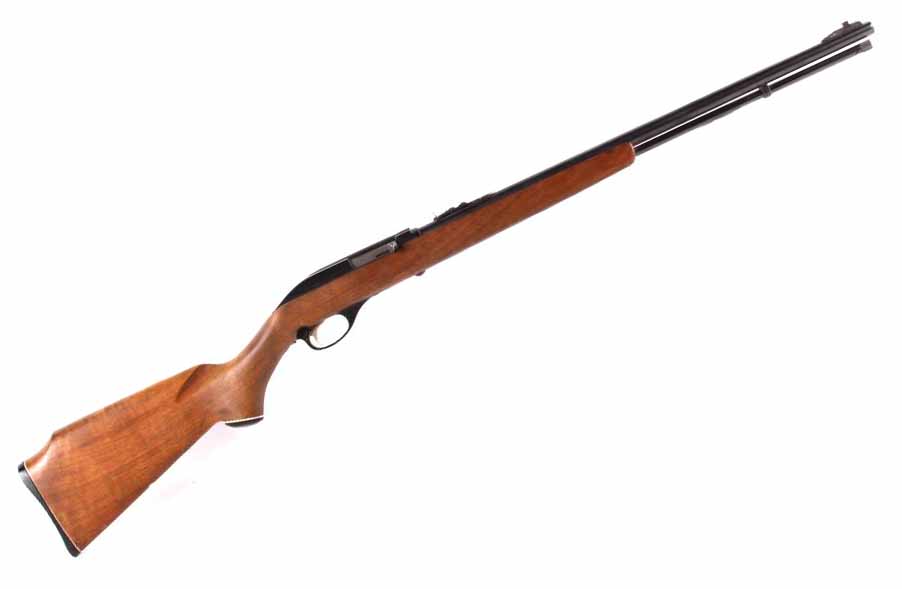
Where the old and the new direct blow-back .22 rifles differed—outside of a few minor design points—was material. The Model 60 was made much more economically, primarily in its stock and magazine inner tube. Whereas the 99 used walnut and rolled steel for these parts, the 60 turned to birch and brass. Arguably, the older rifle boasted a more resilient makeup, but it’s a stretch to say it was more finely made than what has become the standby Marlin .22.
Serendipitously, the more cost-effective material in the Marlin Model 60 perhaps made it a better overall rifle. Particularly the brass inner tube. The cheaper metal proved more apt, impervious to corrosion in an area pervious to moisture and rust, if steel is used. Split hairs if you must over thriftier material, but their assets, for the most part, go down as pluses in most people’s books.
Get The Skinny On Marlin Guns:
- 7 Marlin Lever-Action Rifles Worth Adding To Your Collection
- Original Marlin Papoose is One Great Gun
- Marlin Firearms, Defining American Pride in Craftsmanship
- Marlin FirearmsValues
Design-wise, the Model 60 was as trim and sporty as the 99 and subsequently the 10/22 for that matter. Despite a more traditional tubular magazine, its sleek lines—particularly around the receiver—maintained a contemporary look over all these years. Furthermore, Marlin saw fit to modernize the rifle to suit shooters’ tastes at the time and moving forward. Grooving the receiver to better accept scope mounts was a magnitude more convenient and helped milk the Model’s 60’s accuracy potential.
Not that you’d need a scope to get and keep the rifle in the black. Open rear and ramp front (common on many models) proved more than accurate enough for most .22 applications.
Accuracy Of the Marlin Model 60
It’s been repeated ad infinitum at this point, but still holds true—”only accurate guns are interesting.” Which goes a long way in explaining the persistent appeal of the Marlin Model 60. It’s a tack driver, particularly early iterations.

No knock against the latest runs of the rifle, as they’ll smite the ass of a gnat, but those who’ve been lucky enough to spend time behind an original version understand it was something special. Namely, because Marlin didn’t skimp on barrel.
Gargantuan, especially by modern .22 LR standards, the Marlin Model 60 originally boasted a 22-inch barrel. Long sight radius added to more than enough pipe to ensure a complete powder burn equaled a rifle—once dialed in—that could murder the X-ring, tin cans, varmints, what have you, with unparalleled precision. That’s an endearing point, one that certainly lingers in the minds of those who cut their teeth on the 60. There’s nothing like tasting success early in the process, and shooting is a game of accuracy.
Further enhancing the rifle was Marlin’s MicroGroove rifling. Cutting-edge thinking, Marlin figured shallower grooves for rifling and more of them (16 total) would improve a bullet's indexing down the centerline of the bore, while causing less deformation. Protecting the integrity of the unique system in the Model 60, a target crown, ensuring you didn’t nick the muzzle and blow out the accuracy of the rifle.
Finally, the rifle was optimized strictly for .22 LR ammunition. That might sound funny to contemporary ears, after all a .22 LR is a .22 LR. Except the use of .22 Short and .22 long were much more prevalent when the Marlin Model 60 made its appearance. The cartridges far from mirror each other’s performance, so Marlin making the call to tailor the gun strictly for .22 LR gave it a leg up with the dominant cartridge.
Shoot It All Week
The other factor nearly everyone loved about the Marlin Model 60, regardless of their brand loyalty, was its capacity. Running beneath the 22-inch barrel was an equally long 18-round tubular magazine.
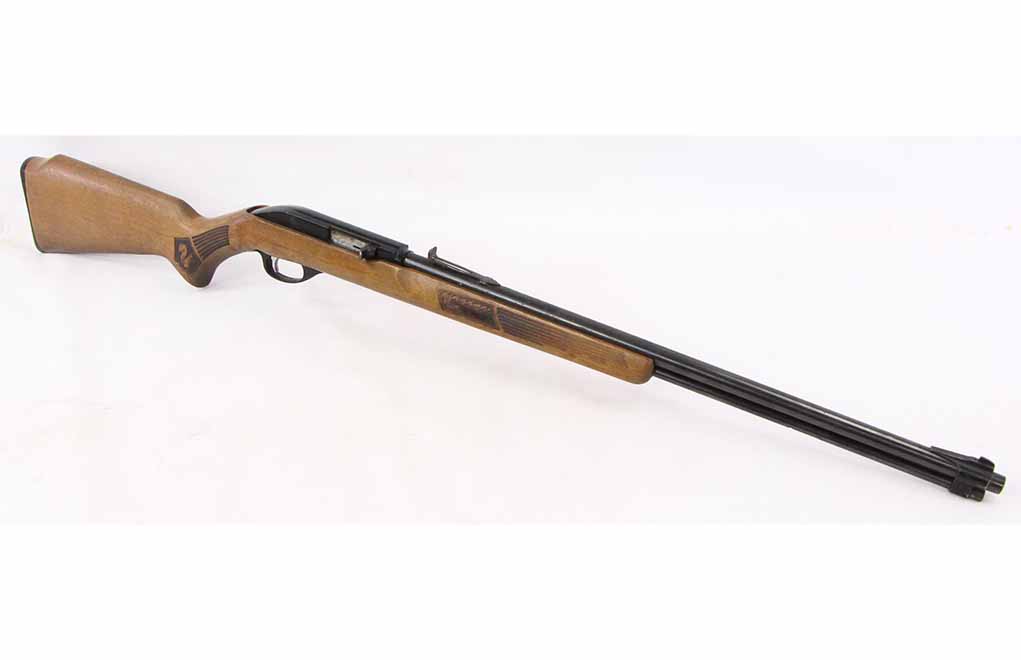
That’s plenty big enough to suit most people’s needs; more than ample to keep the traditional magazine style kicking when removable box magazines were becoming more common. Not to mention, the full-length tube added to the overall aesthetic appeal of the gun—it just looked like it could run.
To many shooters' chagrin, this ended in the late 1980s due to the infinite wisdom of New Jersey state legislators. Marlin shaved down the magazine to 15-rounds to meet recently implemented laws in that state, thus keeping its market share.
Not ugly by any stretch of the imagination, the abbreviated tube gave the rifle a lopsided look—certainly not as smart in appearance as the older version. Someone at Marlin must have agreed, given the barrel soon followed suit in the 2000s, shrinking down the 19-inches to even the rifle out. It also made the Model 60 nimbler and, by most accounts, did little to decay accuracy.
Ready For Action
Not every new tweak to the Marlin Model 60 was met with narrowing of eyes and furrowing of brows. Safe to say, the action has improved over the years, primarily in the 1980s, when a last-round hold-open feature was introduced. It holds halfway after emptying the magazine, though you can lock it fully open by depressing the bolt handle when the bolt is fully rearward.
Outside of that, there isn’t much to improve on the action overall. Not that it’s perfect, though some might take that stance. But there’s literally not much to the mechanism, which is an exceedingly good thing.
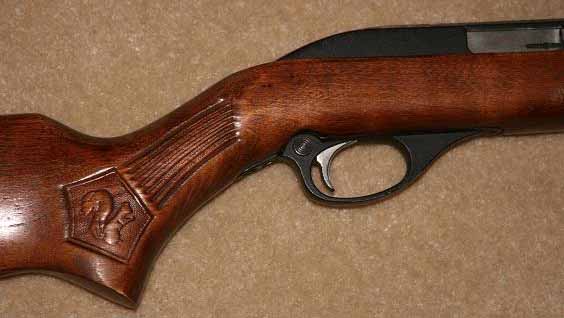
Reliability generally walks hand in hand with simplicity, which is the case with the Marlin Model 60. Further on, its Spartan design also makes it a snap to disassemble and maintain. Remove two screws to free the barreled action. Pull one pin to remove the trigger group. Detach the bolt handle to extract the bolt. Easy peasy, and gives you few excuses for not keeping the Model 60 clean as a whistle.
Parting Shot
No bones about it, there’s plenty to like, even revere, in the old-timey base 22-inch barrel Marlin Model 60. It was everything you needed and nothing more. It’s still worth the hunt to chase down this vintage if you’re lucky enough to find some sucker willing to part with his or hers. Good luck with that.
If you can’t find one on the market or aren’t next in line to inherit one, you’re not out of luck with the company’s present selection. In addition to the base Model 60, there are five variations of the rifle, including 60SB, 60SS, 60C, 60SN and a 60SN with a 4x20mm scope.
Basically, it’s a choice of different stocks and the addition of semi-buckhorn rear sights in some cases. Though the 60SS, it’s also the receiver and barrel material, which are nickel-plated. It’s a sporting option and, like the rest, won’t set you back a paycheck.
And therein lies the real on-the-ground advantage of the Marlin Model 60—old and new—especially for penny pinchers. Over the course of its existence, there might not be and gun that provides greater value. Right now, the MSRP runs from $212 to $321, which is paltry.
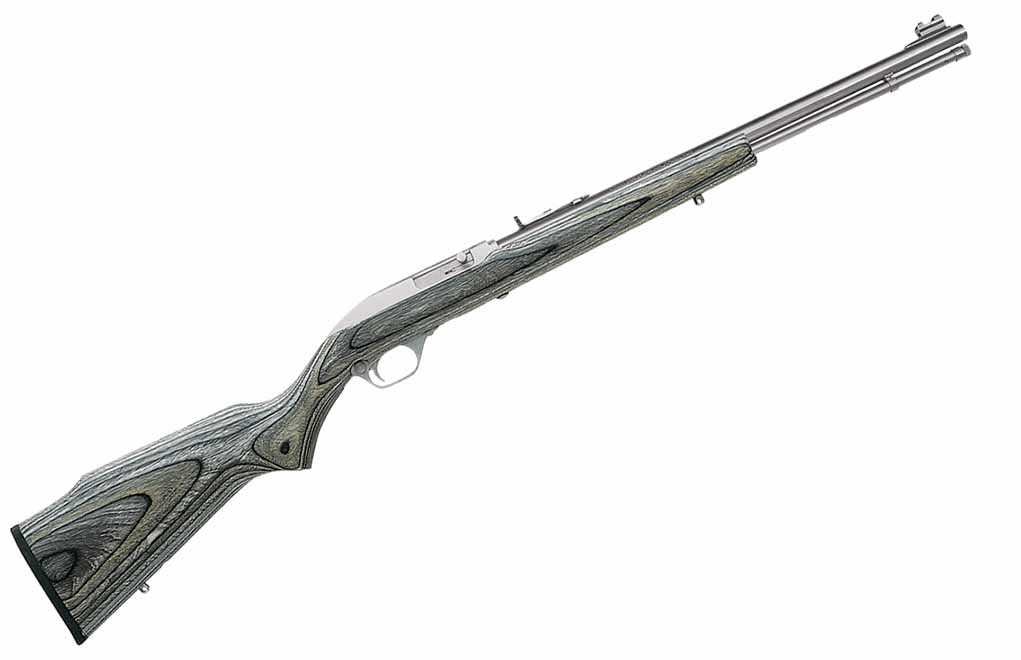
Yeah, there are plenty of options when it comes to .22 rifles and more seem to hit the market every day. But for 60 years running and some 11 million rifles made, most prove pale imitators of the Marlin Model 60. Likely it will continue this way well into this century and many more rifles rolling off the assembly line.
For more information on the Marlin Model 60, please visit marlinfirearms.com.

Next Step: Get your FREE Printable Target Pack
Enhance your shooting precision with our 62 MOA Targets, perfect for rifles and handguns. Crafted in collaboration with Storm Tactical for accuracy and versatility.
Subscribe to the Gun Digest email newsletter and get your downloadable target pack sent straight to your inbox. Stay updated with the latest firearms info in the industry.

![Best Concealed Carry Guns In 2025 [Field Tested] Wilson Combat EDC X9S 1](https://gundigest.com/wp-content/uploads/Wilson-Combat-EDC-X9S-1-324x160.jpg)


![Best 9mm Carbine: Affordable PCCs [Tested] Ruger Carbine Shooting](https://gundigest.com/wp-content/uploads/Ruger-Carbine-Shooting-100x70.jpg)
![Best AR-15: Top Options Available Today [Field Tested] Harrington and Richardson PSA XM177E2 feature](https://gundigest.com/wp-content/uploads/Harrington-and-Richardson-PSA-XM177E2-feature-100x70.jpg)

The article says Question: “Can you shoot .22 mag in a model 60 “your answer ….is “yes – you can shoot .22 short” is that a typo or ? I had one in the 60’s (18 shot I believe) a canine got into our chicken coup & killed 40 chickens ,my Dad grabbed the gun & placed all 18 shots with the finally a head shot @ at least 75 yards! Dad was an old Nebraska squirrel hunter . I used to fill the bullseye then shot the tacks out of all 4 corners . Now i’m 80 & got a new SS model & a 4 X scope & i’m almost as good !
The ONLY reason the Ruger is gaining in popularity is the ABUNDANT aftermarket goodies to be had. I am looking for a good cheap aftermarket stock for mine scarce as hen’s teeth. But I can attest to the accuracy of Marlin rifles they will beat the Ruger every time. and can truly say by experience. Thousands of rounds thru each, Marlin every time.
have you looked at boyd gunstocks? they have quite a few options for the marlin model 60
My best friend has had a stainless Marlin Model 60 in .22 magnum with a laminated stock foe a few decades. He put a “stainless” finish scope on it and it’s beautiful.
Then, also wanting a .22 mag rifle, I went out and bought a Ruger 96/22 mag. Both rifles are classics. But only the Model 60 is still in production.
Eric B.